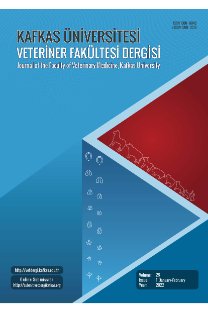A study on determining the opinion of veterinarians on continuing education
veteriner hekimlik, veteriner hekimliği eğitimi, veteriner hekim, anket, hizmet içi eğitim
Veteriner hekimlerin sürekli eğitime ilişkin görüşlerinin belirlenmesi üzerine bir çalışma
veterinary medicine, veterinary education, veterinarians, questionnaires, inservice training,
___
- 1. Öztürk MN: Hizmetiçi Eğitim Uygulamaları, Üniversite, Sanayi ve Endüstri İşbirliği. Tetaş, Ankara, 2005.
- 2. Anonymous: II. Türk Veteriner Hekimliği Kurultayı Komisyon Raporları. Medisan Yayınevi, Ankara, 2002.
- 3. Edwards J: Global perspectives of veterinary education: Reflections from the 27th World Veterinary Congress. J Vet Med Educ, 31 (1): 9-12. 2004.
- 4. Anonymous: May 1998 World Veterinary Association education policies. http://www.worldvet.org/ manuals /education.pdf. Accessed : 05/12/2007
- 5. Caple IW: Continuing professional development for veterinarians. Aust Vet J, 83 (4): 200-202, 2005.
- 6. Moore DA: Evaluating the stages of veterinary practitioner learning for continuing education needs assessment and program evaluation. J Vet Med Educ, 30 (1): 50-56, 2003.
- 7. Moore DA, Klingborg DJ, Brenner JS, Gotz AA: Motivations for and barriers to engaging in continuing veterinary medical education. J Am Vet Med Assoc, 217 (7):1001-1006, 2000.
- 8. Anonymous: Continuing education American Veterinary Medical Association http://www.avma.org/careforanimals/ animatedjourneys/aboutvets/education.asp#AG5, Accessed: 06.12.2007.
- 9. Krejcie RV, Morgan DW: Determining sample size for research activities. Educ Psychol Meas, 30 (3): 607-610, 1970.
- 10. Dinçer F: A survey of veterinary education and administration in Turkey. Dtsch Tierarztl Wochenschr, 98 (5): 179-180, 1991.
- 11. Ozen A, Kalin R, Yerlikaya H, Seker I, Cetinkaya B: Evaluating the curriculum of the veterinary school of Fırat University, Turkey, in terms of professional and technical skills. J Vet Med Educ, 31 (3): 281-188, 2004.
- 12. Özen R, Özen A: Veterinary education in Turkey. J Vet Med Educ, 33 (2): 187-196, 2006.
- 13. Anonymous: I. Türk Veteriner Hekimliği Kurultay Ön Rapor Kitab[, Ankara, 1998.
- 14. Anonymous: AB Uyum Sürecinde Veteriner Hekimlik ve Hayvan Sağlığı Ürünleri. VİSAD, Artpress, Ankara, 2005.
- 15. Özen A, Yüksel E, Özen R, Yaşar A, Yerlikaya H: A study on life satisfactions of Turkish veterinary practitioners. Fırat Üniv Sağlık Bil Derg, 21, 5-10, 2007.
- 16. Anonymous: Continuing education, 201 KAR 16:050. http://wwww.Irc.ky.gov/kar/201/016/050.htm, Accessed: 19.11.2008.
- 17. De Castro P, Zucconi S: Development of European educational strategies: Design of veterinarian profiles identified by market needs for the year 2020. Vet Res Commun, 28 (1): 13- 28, 2004.
- 18. Fernandes T: The role of Vet2020 project on quality of European veterinary education. Vet Res Commun, 28 (1): 9-11, 2004.
- 19. Delver HA: Continuing veterinary medical education needs and delivery references of alberta veterinarians. J Vet Med Educ, 35 (1): 129-137, 2008.
- ISSN: 1300-6045
- Yayın Aralığı: 6
- Başlangıç: 1995
- Yayıncı: Kafkas Üniv. Veteriner Fak.
Ankara tavşanlarında ekzokrin pankreasın histolojik yapısı
Nejdet ŞİMŞEK, EMEL ERGÜN, LEVENT ERGÜN
A study on determining the opinion of veterinarians on continuing education
Şule OSMANAĞAOĞLU, Melek KALKAN, AYŞE MENTEŞ GÜRLER, M. Emin SARDOĞAN
Investigation of pestivirus ınfections in aborted sheep and goats in Burdur region
SİBEL HASIRCIOĞLU, MEHMET KALE, ABUZER ACAR
Occupational ınfections in veterinarians
İSKENDER GÜN, Elçin BALCI, MÜRSEL KARABACAK, SELMA GÖKAHMETOĞLU, Süleyman YAZAR, Ahmet ÖZTÜRK, MUSTAFA ALTAY ATALAY, Ethem BAZ
The venous drainage of the heart in the Tuj sheep
GÜRSOY AKSOY, Erdal ÖZMEN, İBRAHİM KÜRTÜL, SAMİ ÖZCAN, HÜSEYİN KARADAĞ
Gnathia sp. (Gnathiidae) ınfestations on Marine fish species from Turkey
ALİ ALAŞ, Ahmet ÖKTENER, Muhittin YILMAZ
A cutaneous myxoma case in A 12-year-old boxer
DİLEK OLĞUN ERDİKMEN, Haris HAŞİMBEGOVİÇ, GÜLBİN ŞENNAZLI, KIVILCIM SÖNMEZ
MUHAMMET GAFFAROĞLU, Eşref YÜKSEL
NADİDE NABİL KAMİLOĞLU, ALKAN KAMİLOĞLU, Ebru BEYTUT
Effect of ege and sex on fattening performance and carcass characteristics of native Turkish geese
MUAMMER TİLKİ, TARKAN ŞAHİN, MEHMET SARI, SERPİL ADIGÜZEL IŞIK, MUSTAFA SAATCI
